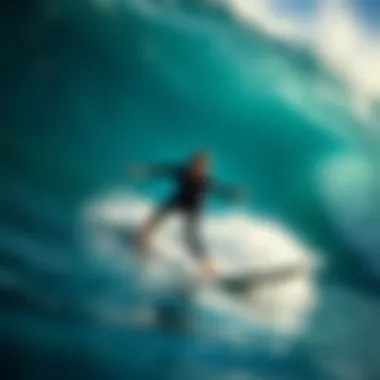Exploring Careers in the Surf Industry: Skills & Trends


Intro
The surfing industry is much more than just catching waves. It’s a thriving ecosystem filled with a multitude of job opportunities, from surfboard manufacturers to marine biologists studying ocean ecosystems. Understanding these avenues can be the difference between just riding the surf and carving out a fulfilling career in the industry. This guide serves not only to map out the various career paths available to both budding surfers and seasoned pros, but also to highlight the essential skills required and the importance of community engagement in this vibrant culture.
In the upcoming sections, we will explore the diverse nature of jobs stemming from this water sport. As technology and environmental issues shift, the role of surfers and surf enthusiasts becomes increasingly vital. We'll unpack everything from product innovation in surfboards to the advocacy for sustainable surfing practices. Recommendations will be tailored specifically for readers interested in contributing to and benefiting from this engrossing field, shedding light on sustainable growth alongside personal and communal development.
Let’s get started by looking at the surfboard itself, as it serves as the cornerstone of the sport and is deeply intertwined with the profession.
Understanding the Surf Industry Landscape
The surf industry is more than just waves and boards; it's a rich ecosystem that intertwines sport, culture, and business. Understanding this landscape is crucial for anyone looking to venture into a career tied to surfing. It can help you pinpoint the current job opportunities, determine which skills will be in demand, and identify the trends that will impact your career trajectory. Those insights are significant for surfers, instructors, beach lifeguards, outdoor writers, and marine biologists alike.
Historical Overview of Surfing as a Profession
Surfing has its roots in ancient Polynesian culture, where it was not just a pastime but a revered activity. Professionally, however, surfing as a career took shape in the 20th century when competitions sprang up, and surf culture began to explode in popularity across the globe. Icons like Duke Kahanamoku forged a path, illustrating that someone could turn a passion into a profitable pursuit. This history is crucial because it puts into perspective modern surfing’s evolution—from a leisure activity to a viable career path for many.
Who's been riding that wave? A good look at historical timelines reveals how positions like surfboard shapers, coaches, and surf brand ambassadors came into being. Early opportunities were limited, but as surfing became mainstream, the job roles expanded. Now, you’ll find professionals in everything from event management to surf journalism.
Current Employment Trends in Surfboarding
The employment landscape for surfers and those connected to the industry is ever-changing. Currently, there’s a noticeable spike in jobs related to eco-friendly surf gear and sustainability, tying right back to the industry's growing awareness about its impact on the environment. Companies are eager to employ individuals who are not only skilled surfers but also knowledgeable about sustainability initiatives. From surf schools that are incorporating environmentally friendly practices to brands focusing on offering natural materials, the shift is palpable.
Some of the most promising job categories include:
- Surf instructors, especially those with certifications in lifeguarding and first aid.
- Marketing specialists for surf brands.
- Social media managers, focusing on platforms like Instagram and TikTok, which capture the visually-driven surf culture.
This trend indicates a blend of traditional surfing roles with modern marketing and management skills.
Market Analysis: Growth of Surf-Related Jobs
The surf industry isn’t just catching waves; it’s growing like wildfire. Recent estimates indicate that the market for surf-related jobs is expanding at a significant pace. Factors contributing to this growth include an increase in the number of surf schools, the rising popularity of water sports, and shifting attitudes towards outdoor activities.
A key aspect to consider is the surge in surf tourism, particularly in areas known for their surf culture. Popular spots like Hawaii, California, and Bali see a constant influx of travelers seeking lessons, guiding services, and rental equipment. The following points illustrate this growth:
- Increase in surf schools: More people are looking to learn, leading to more positions for instructors.
- Rise in eco-tourism: Tourists today want authentic experiences that are also environmentally friendly.
- A focus on brand experiences: Companies are understanding the value of unique, memorable customer interactions, thus creating roles in customer experience and engagement.
Understanding these trends is vital as they shape the surf job market. Knowing where the opportunities lie can be the difference between struggling and thriving in this ever-changing industry.
Diverse Career Paths within the Surf Community
Exploring the various career paths within the surf community reveals the depth and vibrancy of opportunities that exist beyond simply riding the waves. As surfing has expanded from a niche lifestyle to a global phenomenon, the landscape of job prospects also transformed. The diversity of roles not only reflects the multifaceted nature of the sport but also encourages enthusiasts to find their niche. From the adrenaline-fueled competition scene to the gentle, nurturing call of surf instruction, there’s a place for everyone.
Career paths in this space offer not just job stability, but the chance to marry passion with profession. Engaging in surf-related careers opens doors to communities of like-minded individuals, fostering collaboration and collective growth. As such, individuals can benefit from numerous connections and networking which are critical to thriving in such a competitive environment.
Professional Surfing: Sponsorship and Competition
Professional surfing is often viewed as the pinnacle of success for many surfers. The allure of competition, sponsored events, and showcasing skills in prestigious locations can be incredibly appealing. This path, however, comes with its own set of challenges and demands. To become a professional surfer is to accept a lifestyle of rigorous training, discipline, and mental fortitude.
Sponsorship plays a pivotal role. Top brands like Quiksilver and Billabong look for athletes who not only excel on the waves but also embody the spirit of the sport. A strong social media presence and engagement with the audience can significantly enhance a surfer's appeal to potential sponsors.


"Success in competitive surfing is not purely about your talent in the water; it's about branding yourself as a surfer and appealing to sponsors who value that narrative."
Surfboard Manufacturing and Design Careers
The surfboard is an essential tool for any surfer, and that necessity has birthed a range of careers in manufacturing and design. Whether it's creating the perfect board for big-wave surfing or designing eco-friendly options for a more sustainable market, careers here can be incredibly rewarding.
Individuals entering this field often combine their passion for surfing with an understanding of materials and hydrodynamics. Skills in engineering, artistry, and even marketing come into play. Many surfboard manufacturers like Firewire Surfboards focus on innovation, often experimenting with different materials and designs to improve performance.
Networking within these circles is vital, as is staying updated on trends and industry needs. The market rewards creativity and functionality, making this an exciting area for surfers to explore.
Surf Instruction: Nurturing the Next Generation
For those who thrive on sharing their skills and passion, surf instruction is a fulfilling career path. Instructors play a crucial role in demystifying the waves for newcomers. They can develop programs that teach not only the practical skills of surfing but also essential ocean safety and environmental consciousness.
Certifications in teaching can vary, but established associations often provide the necessary credentials, making it easier to gain respect in the community. Schools can pop up around popular beaches, creating a community of surfers eager to learn. The ability to inspire and educate the next generation of surfers holds a unique sense of purpose.
Surf Travel and Guide Services
As the world of surfing expands geographically, so too does the opportunity for surf travel and guiding services. Many surfers dream of traveling to surf pristine waves in exotic locations. That’s where guiding comes in, helping others navigate new locales, understand surf conditions, and immerse themselves in local cultures.
These guide services often require a blend of local knowledge and experience with cues from surf conditions. Guides provide not just adventure, but also security and community for those seeking to connect with the sport on a deeper level. Establishing a reputation for reliability and expertise can lead to repeat clients and positive word-of-mouth within the surfing community.
As you can see, the pathways in the surf community are as diverse as the waves themselves. Each career offers unique challenges and rewards, allowing surfers and enthusiasts to carve their own niche in this ever-evolving industry.
Essential Skills for Success in Surf Jobs
In the rapidly evolving surf industry, possessing a diverse skill set is paramount for any professional looking to thrive. The essential skills required extend beyond mere technical proficiency in surfing. They encompass a spectrum of attributes and knowledge that enhance one's ability to navigate various career paths effectively. From riding the waves to understanding market dynamics, having the right expertise is crucial for standing out in a competitive environment.
Technical Skills: Understanding Wave Dynamics
Understanding wave dynamics is fundamental for anyone involved in the surf industry. It's not just about catching the perfect wave; it’s about comprehending the science behind the waves themselves. This knowledge can lead to better surf instruction, improved surfboard design, and more insightful content creation for publications or online platforms.
An understanding of technical aspects, including swell patterns, tide behaviors, and wind conditions, is essential. This proficiency allows surf instructors to provide safer and more effective guidance to novices. Additionally, surfboard manufacturers benefit from recognizing how different shapes and materials interact with wave forces, leading to innovations in board design.
Interpersonal Skills: Connecting with the Surf Community
Interpersonal skills cannot be overstated in the surf community. This industry thrives on relationships, whether it's fostering loyalty among clients or partnering with brands. Cultivating strong communication skills helps in building rapport with fellow surfers, students, and even potential sponsors.
"In surfing, it's not just about the ride; it's about the connections made along the way."
These relationships often translate into better opportunities for work and collaboration. For instance, an instructor known in the surf community for their engaging personality will often find themselves with more students than those who don’t invest in these social connections. Moreover, strong interpersonal skills can enhance teamwork in surf shops or guiding services, fostering a supportive environment that can withstand economic fluctuations.
Marketing and Branding Expertise for the Surf Industry
In today's digital age, marketing and branding expertise is a game changer in the surf industry. As the market continues to grow, the need for savvy marketers who understand the nuances of the surf culture has become increasingly important. From establishing a captivating brand identity to leveraging social media for outreach, knowledge in these areas opens various doors career-wise.
For instance, knowing how to create engaging content that resonates with the surfing community can dramatically lift a brand’s visibility. Skills in digital marketing analytics help identify trends, enabling brands to offer products that truly resonate with consumers. Understanding the target audience's preferences in a niche market sets people apart. In the surfing industry, where community matters, aligning a brand's message with cultural values is vital for long-term success.
The Role of Technology in Surfboard Employment


The surf industry has been in a constant dance with technology, shaking things up and pushing boundaries. This relationship is critical not just for product development but fundamentally alters how surfers interact with the ocean. Today’s surfboard employment landscape relies heavily on tech advancements that create efficiency, enhance performance, and promote sustainability.
Innovations in Surfboard Design and Production
The evolution of surfboard design is often akin to art meeting science. Companies are employing advanced materials like epoxy and carbon fiber that make boards lighter and more durable. A noteworthy trend has been the integration of computer-aided design (CAD) systems. This tech enables shapers to produce designs with exceptional precision.
For example, brands like Firewire Surfboards are leading the charge with their Enviroboard, which uses a sustainable approach to both materials and production. This is not just about performance; it’s about creating boards that align with the growing consciousness surrounding environmental impact.
Additionally, 3D printing technology is beginning to see its way into surfboard manufacturing. Custom boards can be printed in a fraction of the time compared to traditional methods, all while cutting down on waste. The gap between a surfer’s imagination and reality is closing due to these technological advances. The potential for personalized boards is exciting for both consumers and manufacturers, making them more responsive to market demands.
Digital Marketing Strategies for Surf Brands
In an age where social media can catapult niche brands into the limelight overnight, digital marketing has become a lifeline for surf brands looking to carve out a market. Online platforms, particularly Instagram and TikTok, have transformed how surfers discover brands and products.
Effective digital campaigns often leverage user-generated content. When a surfer shares a video of their ride, it’s not just a personal moment; it’s also free advertising for surf brands. For instance, brands like Rip Curl have harnessed hashtag campaigns that encourage users to showcase their surfing experiences. This serves not only to engage existing customers but attracts new audiences through authentic storytelling.
Furthermore, targeted ads powered by data analytics allow brands to hone in on demographics with specific interests in surfing. With the ability to measure clicks, conversions, and engagement rates, companies can fine-tune their marketing strategies and focus resources more efficiently.
Research suggests that a blend of influencer partnerships and experiential marketing can drive brand loyalty in the surf community. As surfing is as much about lifestyle as it is about sport, surf brands must create an authentic narrative that resonates with their audience.
"Technology and surfing are like the perfect pairing of wave and board; each enhanced by the other's strengths."
As the market continues to evolve, those in the surf job sphere must embrace these technologies, staying agile and innovative. For surfboard manufacturers and marketers, it isn’t just about keeping pace; it’s about leading the charge into the next wave of opportunities.
Sustainability and Community Engagement
The intertwining of sustainability and community engagement in the surfing industry reflects the collective responsibility surfers and associated professionals hold towards the environment and society. As surfing grows, so does its impact on coastal habitats and the communities surrounding them. Ensuring that these areas remain vibrant for future generations is both an ethical obligation and a practical necessity for everyone involved.
A strong focus on sustainability can significantly benefit the surfing industry by fostering loyalty among consumers who value environmental stewardship. Moreover, eco-friendly practices often lead to innovative approaches in manufacturing and surfboard design, attracting a clientele that is passionate about preserving their playground. For example, companies such as Patagonia and Firewire have dedicated themselves to reducing their environmental footprint by utilizing recycled materials and promoting responsible manufacturing processes.
Ultimately, community engagement nurtures relationships that bolster the local economy and promote healthy lifestyles. Surf shops often act as community hubs, offering not only equipment but also workshops and events that raise awareness about surf conservation efforts.
Conservation Efforts within the Surf Community
Grassroots conservation initiatives play a pivotal role in shaping a sustainable future for the surfing industry. For instance, organizations like Surfrider Foundation and 1% for the Planet connect surfers with environmental advocacy, emphasizing the responsibility to cherish and protect the ocean. These programs mobilize surfers to engage in beach clean-ups, monitor water quality, and campaign against pollution.
Engagement doesn’t stop with organized efforts. Individual surfers also contribute by adopting sustainable practices such as:
- Reducing plastic use through reusable water bottles and surf gear.
- Supporting local businesses that practice responsible sourcing and waste management.
- Participating in community meetings to discuss local environmental challenges.
The surfing community’s active involvement in conservation projects not only enhances local ecosystems but also raises awareness about the broader challenges of climate change and ocean health.
Promoting Responsible Surfing Practices
Promoting responsible surfing practices is essential to ensure these precious environments can withstand the pressures of increased visitation and use. Education is a critical component; many surf schools now incorporate environmental philosophies into their instruction. This can include lessons on:
- Respecting wildlife and habitats while surfing.
- Following designated paths to avoid trampling sensitive dune ecosystems.
- Understanding the importance of adherence to local regulations and protected areas.
Moreover, surfers can take personal initiatives, such as:


- Sharing knowledge and best practices with newcomers at the beach.
- Advocating for responsible surf tourism that respects local communities and ecosystems.
Emphasizing care in surf culture cultivates a sense of stewardship where sound practices are the norm. It creates a community of responsible surfers who are in tune with their environment, positively impacting the long-term sustainability of the industry.
“We do not inherit the Earth from our ancestors; we borrow it from our children.” —Antoine de Saint-Exupéry
Challenges and Opportunities in the Surf Job Market
The surf job market is an ever-evolving landscape that reflects broader economic currents and shifting tides in consumer behavior. Understanding this market is vital for anyone looking to dive into a surfing-related career, whether as a surfer, an instructor, or an innovator in surfboard manufacturing. The importance of this topic cannot be overstated—recognizing the challenges faced by the industry can help budding professionals make informed decisions, while also spotting opportunities that may align with their skills and passions.
Navigating Economic Fluctuations
Economic fluctuations can be as unpredictable as the waves themselves. For the surf industry, this means that job stability may vary significantly depending on broader economic conditions. During economic downturns, discretionary spending on surfboards, gear, and travel may shrink, leading to fewer opportunities in professional surfing and related fields. All too often, instructors may find fewer students, and surf shops can face tough competition.
However, these challenges are not without their silver linings. Recessions often inspire creative solutions. Companies may pivot to emphasize more affordable products or services, opening doors for those with a knack for innovation. It's crucial for individuals in the surf industry to stay adaptable, allowing them to ride the wave of economic change rather than getting swept under.
Some actionable strategies for navigating economic fluctuations include:
- Diversifying Skill Sets: Learning new skills outside of surfing—like marketing, social media management, or even marine biology—can create additional career pathways.
- Building Community Connections: Establishing relationships with local surf schools, shops, or conservation groups can lead to more opportunities despite the broader market fluctuations.
- Being Open to New Roles: Sometimes the best way forward is to take roles that may not be a traditional fit but can provide valuable experience and networking potential.
Adapting to Changing Consumer Preferences
Consumer preferences in the surfing world are in constant flux. Nowadays, surfers are increasingly leaning towards eco-friendly gear, sustainable practices, and brands that resonate with their values. This shift represents both a challenge and an opportunity.
As surfers become more environmentally conscious, companies are faced with the pressure to adapt to these preferences. Brands that ignore this shift risk losing relevance. On the flip side, understanding and embracing these principles can lead to increased loyalty and new market niches. For instance, surfboards made from sustainable materials or those that promote carbon-neutral practices are becoming attractive options for modern consumers.
A few strategies for surf professionals to adapt to changing consumer preferences include:
- Engaging with Customers: Encouraging feedback through social media platforms or surveys can foster a deeper understanding of what consumers value.
- Sharing Values: If your brand incorporates sustainability, communicate that effectively. Consumers are drawn to narratives that align with their beliefs, which can aid in building brand loyalty.
- Staying Informed: Keep an eye on industry reports, consumer behavior studies, and market trends that provide insights into future preferences. Websites such as Statista can be a helpful resource.
In summary, while the surf job market presents significant challenges through economic fluctuations and evolving consumer preferences, it also offers ample opportunities for those ready to adapt and innovate.
By recognizing these factors, individuals looking to carve their path in the surf industry can better navigate the waters to find, not just their footing, but a promising career.
For further reading on surf industry trends and economic impacts, visit Wikipedia: Surfing or explore National Geographic for insights on environmental impacts.
Finale
The importance of understanding the evolving landscape of careers in surfboarding cannot be overstated. As waves of innovation and change continue to shape the surf industry, it becomes essential for anyone involved—be it surfers, instructors, or those working behind the scenes—to stay attuned to new possibilities and emerging trends. Analyzing the future of careers in surfboarding is crucial for several reasons.
The Future of Careers in Surfboarding
Diversity in Opportunities: The surf industry is no longer limited to just surfing competitions and board manufacturing. As consumer demand evolves, new roles are emerging. Positions in environmental advocacy, surf tourism, and digital marketing for brands are on the rise.
Adaptability Is Key: As highlighted in previous sections, being able to adapt to changing consumer preferences is a critical success factor. The industry thrives on shifts in lifestyle and technology, which often reshape job roles. For example, an increasing focus on sustainability is leading to new job descriptions in eco-friendly surfboard production and waste management initiatives.
Skill Development: For those intent on riding the waves of opportunity, investing in relevant skills becomes paramount. Whether it's honing technical skills related to wave dynamics or mastering digital marketing strategies, staying equipped with the latest knowledge will open doors—a surfer without skills is like a boarder stuck in flat water.
Community Engagement: The surf community has a rich history of collaboration and support. People who build strong networks within this tight-knit community often find themselves with unexpected job offers and mentorships. Engaging with local surf clubs, joining conservation efforts, or even participating in surf competitions can all be avenues for future career paths.
In summary, navigating the employment landscape within the surfing industry requires a blend of awareness, flexibility, and community involvement. By recognizing the vast array of career opportunities and continuously adapting to change, surfers and industry professionals alike can ensure they not only keep their heads above water but also thrive in an ever-dynamic environment. As the tide of the surf industry continues to rise, those equipped with the right knowledge and mindset will stand the tallest above the waves.
"The ocean stirs the heart, inspires the imagination, and brings eternal joy to the soul."
For further reading about career landscapes and current trends, visit resources like Wikipedia and Britannica. The integration of sustainability and technology in the sports domain is something you would want to keep an eye on, so platforms like Reddit and educational domains .edu can also provide meaningful insights.















